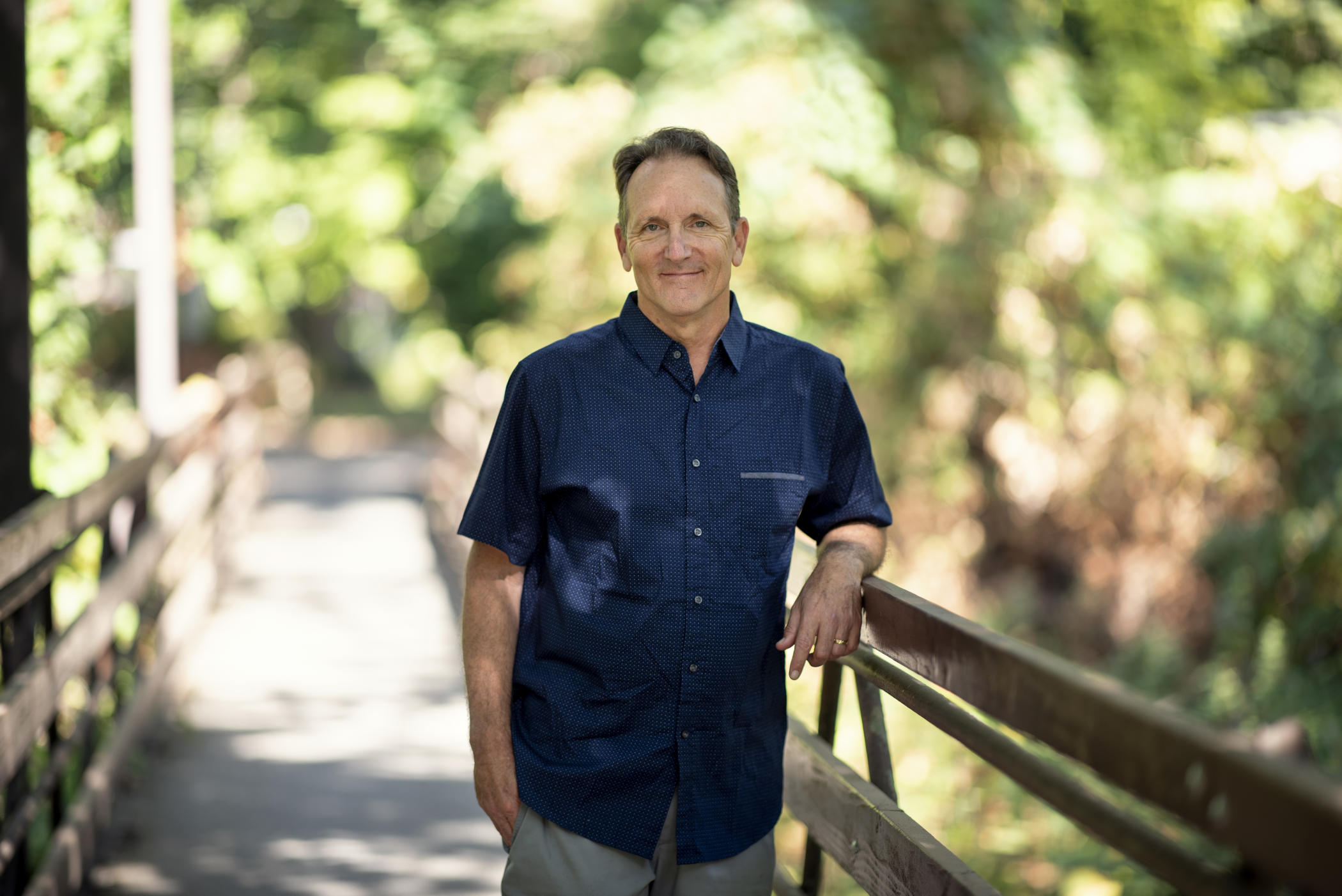The Science of Engaging Students

Al Schademan is recipient of this year’s Faculty Innovation and Leadership Award, photographed on campus on Wednesday, August 7, 2019 in Chico, Calif. The Faculty Innovation and Leadership Award recognizes outstanding faculty who are implementing innovative practices that significantly improve learning and course outcomes, or who have demonstrated leadership at the department, college or university level to improve student success. (Jessica Bartlett/University Photographer/CSU Chico)
Al Schademan is working to change the world—one classroom at a time.
The science education professor is the creator and codirector of the grant-funded Triad Project, an innovative program bringing together University professors, local school teachers, and Chico State student teachers to create classroom-ready science curriculum that meets the national Next Generation Science Standards (NGSS).
“To me, science is the way to get kids excited about learning,” he said. “You’re playing with tuning forks to understand how sound works, for example. They’re really interested in it—it’s contextualizing.”
For his efforts and success, Schademan has been recognized with the California State University’s 2019–20 Faculty Innovation and Leadership Award—one of the system’s highest faculty honors.
The idea for the Triad Project was born of practical need: In teaching science education methods courses at Chico State, Schademan noticed his students had few opportunities to gain practical teaching experience in local elementary and middle schools. Few science units were being taught, and local teachers were in dire need of professional development in the new science standards, which went into effect in 2013.
“These standards are complex,” he said. “Teachers often don’t have time to understand the standards and then say, ‘Let’s create some units.’ It happened in our program because we were given the resources.”
Funded by the S.D. Bechtel, Jr. Foundation, Schademan’s “triads” brought together one student teacher, one University education professor, and one teacher working in the Chico Unified School District to collaborate on an area of the standards and create a weeklong unit of curriculum.
The $980,000 project completed its fourth and final year in spring 2019. Over the grant period, 74 one-week units meeting the new standards were created and made available online for free download; 39 local teachers were trained on the standards; and dozens of student teachers received invaluable experience developing exciting, classroom-ready curriculum.
But Schademan’s passion for getting science back in classrooms goes beyond engaging students today. With education policy over the last several decades moving away from a focus on science and the humanities, he worries students will be ill-prepared to handle the complex and pressing issues facing our futures.
“If we ignore science, we do so at our own doom,” he said, citing climate change as the greatest example. “I want to create a next generation of students who think scientifically and critically and go to the voting box and vote for the right people, based on facts and based on science.”

The Triad Project is one major step in that direction. Science curriculum units are now in use across all schools in Chico Unified, and Schademan’s team is working with the district to adopt high-quality NGSS curriculum. He is also working on improving the science methods class at Chico State to make it mandatory for student teachers to plan and teach a science unit.
The Triad Project has also made a lasting impact on the School of Education (SOE) and all its programs. The observational tool used for supervising student teachers, dubbed the Chico CORE Rubric, was so successful during the project, the SOE adopted it as its new rubric for evaluation. Faculty report the instrument has shifted the conversation about teaching practice because it asks the observer to focus on student behaviors rather than teacher actions.
“We wanted a rubric that would allow us to improve the feedback that we give to student teachers, and the CORE Rubric has helped us do that,” Schademan said. “The rubric actually focuses on what students are doing, not just looking at teacher actions, as we were doing previously.”
SOE faculty are collecting data from the new instrument and drafting a document about the Triad Project as a multi-level professional development activity system for teaching the NGSS.
“The Triad Project is truly transforming the way we think about preparing teacher educators,” said Angela Trethewey, dean of the College of Communication and Education. “While the work has had significant local impact, it is also a project that is sustainable, contextually replicable, and scalable.”
Colleague and education professor Mimi Miller agrees.
“Even after the grant ends, Al Schademan’s Triad Project will leave a legacy of sustained changes to science education in our region,” Miller said. “While Al would say that the success of Triad is due to the efforts of many, it would not have happened without his knowledge of science education and dedicated leadership.”
The annual Faculty Innovation and Leadership Award recognizes educators demonstrating extraordinary leadership to advance student success. Nineteen recipients across 18 campuses will be honored in October at the CSU’s 2019 Graduation Initiative 2025 Symposium in Sacramento. The award comes with a cash prize and department contribution.
Unsurprisingly, Schademan says he was surprised and humbled by the recognition.
“You expect the big scientists and business folks to get awards like that, not the educator who’s trying to get kids interested in science,” he said. “I have to tell you, it’s really nice.”
Schademan earned his doctoral degree in teaching and curriculum from the University of Rochester and his master’s degree in teaching and learning from the University of Utah. Before his graduate work, he taught life, environmental, and earth science for eight years in both public and private schools.


